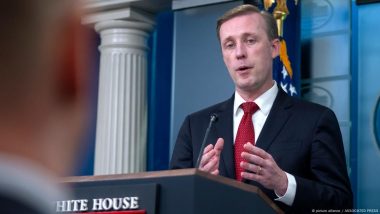National Security Adviser Sullivan emphasized that the US must outpace its rivals, including China, in harnessing AI technology. The plans also address risks, with a focus on protecting privacy and human rights.President Joe Biden has instructed the US national security agencies to use Artificial Intelligence (AI), outlining a plan that also seeks to mitigate the technology's risks.
Also Read | Delhi Shocker: Man Stabbed to Death for Resisting Mobile Snatching Bid in Karol Bagh Area, Probe Underway.
A White House memo issued on Thursday called on federal agencies to "improve the security and diversity of chip supply chains ... with AI in mind."
The framework was signed by Biden and comes a year after he issued an executive order on regulating AI. It is designed to ensure that national security agencies have access to the latest and most powerful AI, while also managing its risks.
What did the White House say?
National Security Adviser Jake Sullivan called it the first-ever plan to ""harnessing the power and managing the risks of AI to advance our national security" during his speech at the National Defense University in Washington.
"We have to be faster in deploying AI and our national security enterprise than America's rivals are in theirs." Sullivan said. "They are in a persistent quest to leapfrog our military and intelligence capabilities."
He warned that otherwise, the US risks "squandering our hard-earned lead."
"Countries like China recognize similar opportunities to modernize and revolutionize their own military and intelligence capabilities," Sullivan said.
Balancing gains with risks
Thursday's memo also called on US security agencies to "monitor, assess, and mitigate AI risks related to invasions of privacy, bias and discrimination, the safety of individuals and groups, and other human rights abuses."
It also urged for a framework for Washington to work with its allies to make sure AI ""is developed and used in ways that adhere to international law while protecting human rights and fundamental freedoms."
There are concerns that AI's use by the US government could lead to it being harnessed for mass surveillance, cyberattacks, or lethal autonomous devices.
The American Civil Liberties Union said Thursday the government was giving too much discretion to national security agencies, which would be allowed to "police themselves."
"Despite acknowledging the considerable risks of AI, this policy does not go nearly far enough to protect us from dangerous and
unaccountable AI systems," Patrick Toomey, deputy director of ACLU's National Security Project, said.
But Sullivan said the framework seeks to embrace AI in a manner that would still protect privacy and human rights, as well as ensure that AI systems do not undercut US national security, Sullivan said. He added that the same principles did not bind competitors.
The White House adviser noted that AI is already reshaping how national security agencies manage logistics and planning, improve cyber defenses and analyze intelligence.
The military use of AI has caused some controversy, particularly around the use of lethal autonomous drones, which are capable of taking out targets at their own discretion.
The US issued last year a declaration calling for international cooperation on setting standards for autonomous drones.
rmt/lo (AFP, AP, Reuters)
(The above story first appeared on LatestLY on Oct 25, 2024 01:10 AM IST. For more news and updates on politics, world, sports, entertainment and lifestyle, log on to our website latestly.com).













 Quickly
Quickly





















